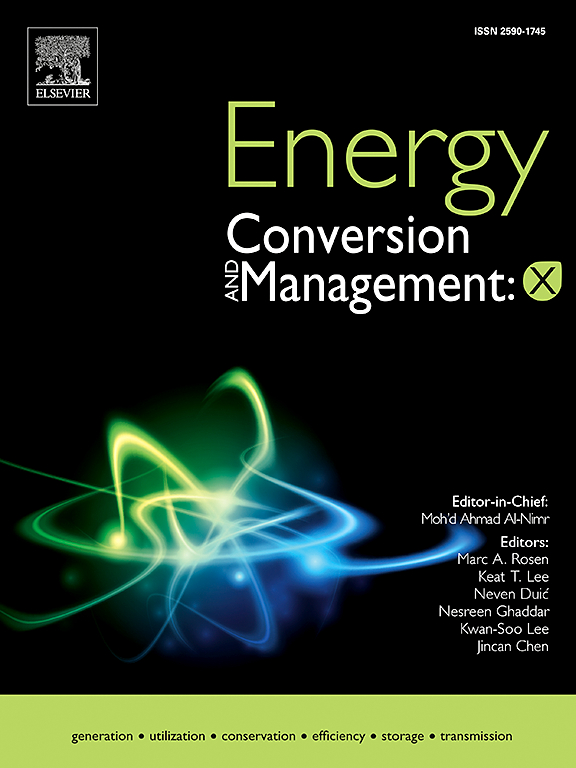Optimization and simulation of Tucuma and Ungurahui biodiesel process parameters and their effects on fuel properties
IF 7.1
Q1 ENERGY & FUELS
引用次数: 0
Abstract
The conversion parameters in biodiesel production have a substantial impact on the yield of methyl esters, consequently affecting the physicochemical properties of the fuel. Tucuma and Ungurahui bio-oils were used in this study to optimize the process parameters. A total of 27 transesterification experiments were conducted for each bio-oil, and the results were statistically investigated using the RSM approach. In addition, advanced kinetic modelling was performed using Aspen Plus software tools on the Tucuma biodiesel transesterification process to investigate the key effect of process parameters on the fuel properties. The study found a greater yield of 99.4 % and 99.5 % for Tucuma and Ungurahui, respectively, under optimized parametric conditions. ANOVA tests revealed lower p-values for catalyst and temperature, indicating their significant influence on the conversion process. For both fuels, GC–MS tests recorded 100 % methyl esters, and fuel properties agree with the ASTM biodiesel standards. Notably, the viscosity of both biodiesels is 4.0 mm2/s, which closely matches that of diesel fuel. Furthermore, the process parameters such as methanol-to-oil ratio, catalyst, and temperatures influenced the methyl esters such as oleate, linoleate, and palmitate, impacting properties density and calorific value. Besides, viscosity was affected by the time parameter, which in turn influenced methyl stearate. The study concludes that while the process parameters influenced the fuel properties, their overall impact on the change was marginal.
优化和模拟图库玛生物柴油和翁古拉汇生物柴油工艺参数及其对燃料特性的影响
生物柴油生产中的转化参数对甲酯产量有很大影响,从而影响燃料的理化性质。本研究使用 Tucuma 和 Ungurahui 生物油来优化工艺参数。针对每种生物油共进行了 27 次酯交换实验,并使用 RSM 方法对实验结果进行了统计分析。此外,还使用 Aspen Plus 软件工具对 Tucuma 生物柴油酯交换过程进行了高级动力学建模,以研究工艺参数对燃料特性的关键影响。研究发现,在优化参数条件下,Tucuma 和 Ungurahui 的产量分别提高了 99.4% 和 99.5%。方差分析测试显示,催化剂和温度的 p 值较低,表明它们对转化过程有重大影响。对这两种燃料进行的气相色谱-质谱(GC-MS)测试均记录了 100% 的甲基酯,燃料特性符合美国材料与试验协会(ASTM)生物柴油标准。值得注意的是,两种生物柴油的粘度均为 4.0 mm2/s,与柴油的粘度非常接近。此外,甲醇与油的比例、催化剂和温度等工艺参数会影响油酸甲酯、亚油酸甲酯和棕榈酸甲酯的性质,影响密度和热值。此外,粘度受时间参数的影响,而时间参数又影响硬脂酸甲酯。研究得出结论,虽然工艺参数会影响燃料特性,但它们对变化的总体影响微乎其微。
本文章由计算机程序翻译,如有差异,请以英文原文为准。
求助全文
约1分钟内获得全文
求助全文
来源期刊

Energy Conversion and Management-X
Multiple-
CiteScore
8.80
自引率
3.20%
发文量
180
审稿时长
58 days
期刊介绍:
Energy Conversion and Management: X is the open access extension of the reputable journal Energy Conversion and Management, serving as a platform for interdisciplinary research on a wide array of critical energy subjects. The journal is dedicated to publishing original contributions and in-depth technical review articles that present groundbreaking research on topics spanning energy generation, utilization, conversion, storage, transmission, conservation, management, and sustainability.
The scope of Energy Conversion and Management: X encompasses various forms of energy, including mechanical, thermal, nuclear, chemical, electromagnetic, magnetic, and electric energy. It addresses all known energy resources, highlighting both conventional sources like fossil fuels and nuclear power, as well as renewable resources such as solar, biomass, hydro, wind, geothermal, and ocean energy.
 求助内容:
求助内容: 应助结果提醒方式:
应助结果提醒方式:


